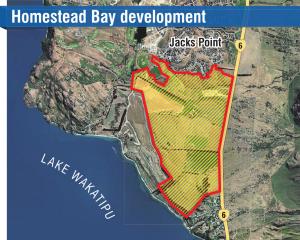Tensions between wealthy landowners in leafy Lake Hayes bubbled to the surface at a resource consent hearing in Queenstown this week.
The applicant, Phil Dunstan, was accused of using his control of local water supply as leverage to discourage neighbours from objecting to his proposal to build a cottage and garage on his Slope Hill Rd property.
A Queenstown Lakes District Council planner has recommended the application be refused, while all six submissions from neighbours are opposed.
One neighbour, Queenstown GP Val Miller, told commissioner Denis Nugent that surrounding properties got their water from a well on Mr Dunstan's land, something he had used as ''leverage to discourage people from opposing his consent application''.
''He has used his ownership of the water supply to properties around him to put pressure on them to withdraw objections.''
Mr Dunstan told the hearing he had owned the property for about 20 years, and after some subdivision and development, had retained 8ha consisting of two lots, each with an approved building platform.
Although based in Nelson, he spent one week a month in Queenstown, and wanted to live in the cottage.
He planned to give the two lots to his children so he could live near them and any future grandchildren.
But Dr Miller said Mr Dunstan already had two consented building platforms on his land, and should build his ''granny flat'' on one of those.
While she supported the idea of elderly relatives living near their families, she did not feel ''Mr Dunstan at age 60 is in need of this type of supportive care''.
''This is just a backdoor way of getting another subdivision of his property.''
Approving the application could set a precedent for everyone living along the road, entitling them to apply for second dwellings remote from their building platforms.
''Suddenly, we will have twice the number of dwellings on one of the basin's most picturesque roads, thus transforming it into just another subdivision.''
Another neighbour, resort lawyer Graeme Todd, said he had no issue with the proposal's design, scale or location, but was concerned by the potential for ''cumulative degradation'' of the area's rural character.
Other neighbours' submissions tabled at the hearing listed concerns about ''over-domestication'' of the landscape, potential for further subdivision and Slope Hill Rd's inability to cope with more traffic.
In her report, council planner Alana Standish said granting the application would increase density in the rural general-zoned area, and could set a precedent.
A dwelling could be built on the already approved building platform, she said.
The applicant's consultant planner, Ben Farrell, said although the development could cause ''cumulative adverse effects'' on the landscape, those effects were localised and had been sufficiently remedied or mitigated to be acceptable''.
There was no ''magic number'' for deciding the acceptable level of building density in a rural landscape and each case needed to treated on its merits.
Mr Nugent said the ''nub of the issue'' was the point where continuing residential development undermined the rural character of an area.
He reserved his decision.











